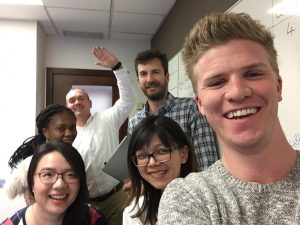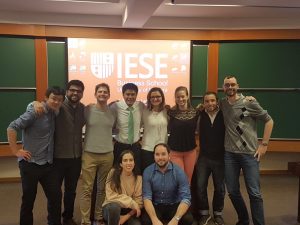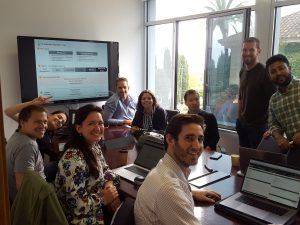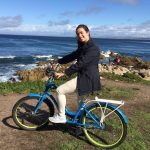The application for IESE MBA Class of 2021 is now LIVE! To help our future applicants better navigate the MBA application process, we’ve sought the help of three of our MBA Class of 2019 students here in our IESE MBA Admissions Insider Series. In Part 2 of this series, these students tell you how they approached the essay writing portion of the application and what helped them along the way.
Meet our panel of students from the MBA Class of 2019!

Matthew Crawford, United Kingdom
Pre-MBA: Senior Consultant at Newton Europe
Educational Background: Economics
https://www.linkedin.com/in/mcrawford3/

Dagný Engilbertsdóttir, Iceland
Pre-MBA: Foreign Exchange Broker at Islandsbanki
Educational Background: Economics
https://www.linkedin.com/in/dagnyengilbertsdottir/

Pablo Paternina, Spain
Pre-MBA: Financial Advisor at Abante
Educational Background: Philosophy
https://www.linkedin.com/in/pablo-paternina-56841230/
How do I get started with the essays in the MBA application?
Pablo: For me, the best way to start the essay would be to jot down a few ideas to get yourself thinking. I considered what attributes do I have which resonated well with the school and what connections can I make there? What schools are really looking for is for you to really show who you are.
Dagný: I think the problem with essays is simply starting. These essays are not on a specific topic that you can research, they are more about yourself. Start with a few bullet points and fine tune them later. But I agree – the best thing to do is simply get started, brainstorm on your ideas, and pick out the most important things. When introducing yourself, find a mix between experiences you’ve gone through and what intentions you have for the future.
Matt: The thing that really helped me the most was talking to other people, friends, people I knew who applied to an MBA in the past. Once you sit and listen to someone tell his story, you see the reasons why they wanted to do an MBA. That’s what you talk about in the essays. Be clear on why you want to do your MBA and have some passion when you write about it. It is sometimes hard to get to that point but the more you think about it, the more you explore it, that is the best way to capture what you want to say.
Pablo: Let some time pass from the time you write it, then edit it. Show it to as many people as you can, people who know you – family, friends, colleagues – and have them take a look at it as well.
How did you tackle the question on your career goals?
Dagný: For me, I sat down and looked up some people who I thought were doing interesting things and I ended up deciding in half an hour that I wanted to pursue a career in Venture Capital in the future. I thought to myself, “This is interesting, I sat here for 30 minutes and I discovered what I really want to do. Meanwhile I’ve been thinking about this for the past 27 years and I still did not come up with an answer before this”. I think it is also beneficial to speak to other people. What is most important here is really understanding that this all makes sense and sometimes, the outside perspective can help.
Matt: I remember agonizing over the question “What do you want to do after the MBA?”. I ended up realizing I wanted to do Strategy Consulting in one of the biggest consulting firms. I remember writing that essay then getting to IESE and reminding myself, “Oh yeah, this is what I am here to do”. Have a really quick goal while you’re here because there are so many things you can do when you get here that it’s easy to get distracted or overwhelmed. That essay question from IESE helped me understand where I should put my focus, it was hard but I was able to get the internship that I wanted at BCG over the summer. Having that essay in mind and going through that process made the difference.
Looking back, would you have approached the application process differently?
Dagný: Yes, I would approach it differently. Where I come from, it is not common to pursue a MBA. Someone just told me, “You have a great profile, you should look into a MBA.” In the beginning I did not have a proper understanding of the scope of my options. I was just looking at what people whom I admire had done before – for example these women in Venture Capital who had done a MBA! But the major takeaway for me was that I did not start speaking to people from the programs that I was considering soon enough. So I applied to 5 schools which meant a total of 21 essays!!! If I had done that sooner, I could have saved myself a lot of time and effort!
Pablo: I have been thinking about an MBA for a few years because I studied Philosophy. I knew I really wanted to get a formal business education. For me, it was really “What is the best school that can give me that education” and “Where do I want to be after the MBA”. I knew I wanted to be in the US and New York, so I thought “What do I have to do to achieve these goals” I spoke to a lot of friends in the US who were doing MBAs – the impression I got from them was that academics was not their priority which was going to be very important for me. I knew IESE was going to be very strong on the academics and that was one of the reasons I decided to come here. For me it is also important to have international exposure since I am Spanish. Here at IESE, I have been amazed that it is truly diverse, truly international, with people from completely different countries. IESE is a lot better on this than other schools.
Dagný: I always knew after I studied my Bachelor’s that I wanted to further my studies. I feel like I should have just done the GMAT earlier knowing I was going to do a MBA at some point so I can focus more on other things, to make the whole process easier and less rushed.
How can you differentiate yourself in the application?
Matt: First, everyone has an amazing story somehow. There’s always a fear that you don’t have something different. If IESE is interested in your profile, then it probably means that you have something that makes you stand out already. Don’t let it worry you too much. If there’s potential there, you should be proud that it can be a possibility. Second, the standards are high – GMAT, CV, everyone is really excellent there, that is already expected – so it is important to speak about the things that keep you busy in your spare time – things that you enjoy talking about. All your basic requirements should be great but don’t forget to highlight who you are as a person.
Dagný: One of the first things we did as a team was to go through each CV and I thought to myself “Everyone here is so amazing and my CV isn’t really as good as theirs.” But when it was time to give everyone feedback, we all felt the same way. It’s funny how we look at our own experiences very differently. In your head you may think “I’m probably not good enough, everyone else is better” but that is most likely not the case. Again, what’s most important is to show what you care about, what you’re passionate about and what you’re proud of – just don’t be shy!
Pablo: I thought I was pretty good when I got here (laughs)…but I look around and I realize I was nothing compared to the people around me. But really, it is focusing on who you are. It is a real practice of self-reflection, know yourself inside out. Then there’s the side of selling yourself, your story, which is a huge part.
Matt: Whatever it is you do, if you can speak passionately about it, that in itself makes it stand out.
Dagný: Also, there are some cultural differences at play. In some countries, people are less shy to tell people about how great they are and in other countries, it’s not cool. Don’t be afraid to brag a bit, you’ve probably done some great things. Realize who you’re up against, other cultures are selling themselves like crazy – make sure that you’re giving yourself the credit you deserve. Make sure to ask people to help you use the correct words, not to go overboard but to at least do yourself justice.
Final advice to future IESE MBA applicants?
Matt: At IESE there are many fantastic things – the Case Method is a great learning experience, it is a very diverse school, lots of international students and opportunities – all this is great but it is important to put an angle to your application – the story that you tell is the most important thing. Okay, IESE has the Case Method but why is that useful to you? What does that help you do? For me, going into consulting – the case method is amazing because all I would do in consulting is cracking cases and that was a huge thing for me. Another is I have great experience but it was all focused in one place. For me coming to IESE rather than a school in other English speaking countries gives me an opportunity to work internationally. Yes, understand what makes IESE great but ask yourself “Why do you care about it?” and that helps you understand why IESE is special.
Pablo: Give yourself time. You really have to be transparent with who you are in the whole application. One way to test this is if you can let someone who does not know you at all read your essays, and ask them to explain who you are in their own words. If they can do that accurately, then you have succeeded!
Dagný: There are many things you can find online. You will find out what you care about and what you don’t. Then start setting criteria for yourself. I did not know what I wanted when I applied to all these schools. In the end the criteria that was important to me was diversity, ability to work in Europe, and, let’s be honest, I am from Iceland – I wanted good weather. I knew academics here were good, the school is among the top but I wanted to have a good quality of living as well during my MBA. Even if we’re busy all the time, I get to take my breaks in the sunshine, walk home and have beautiful views, we get to eat well in good restaurants which is one thing I would not have enjoyed the same way in other cities. Personally I would take into account the whole package – your quality of life, what you want to get out of it and where you want to go.
Matt: The big thing was actually coming to campus and seeing it for myself. There’s only so much you can get from rankings and anything that you find online. Get a feel of where you want to live and study. And in the application you can really say, I went there and saw it for myself.
We hope you found this helpful, thank you Pablo, Dagný and Matthew! Good luck future applicants!
This blog post was adapted from an IESE webinar series. To watch the full webinar, click here.
Pursue your dream MBA! Take these next steps today:







